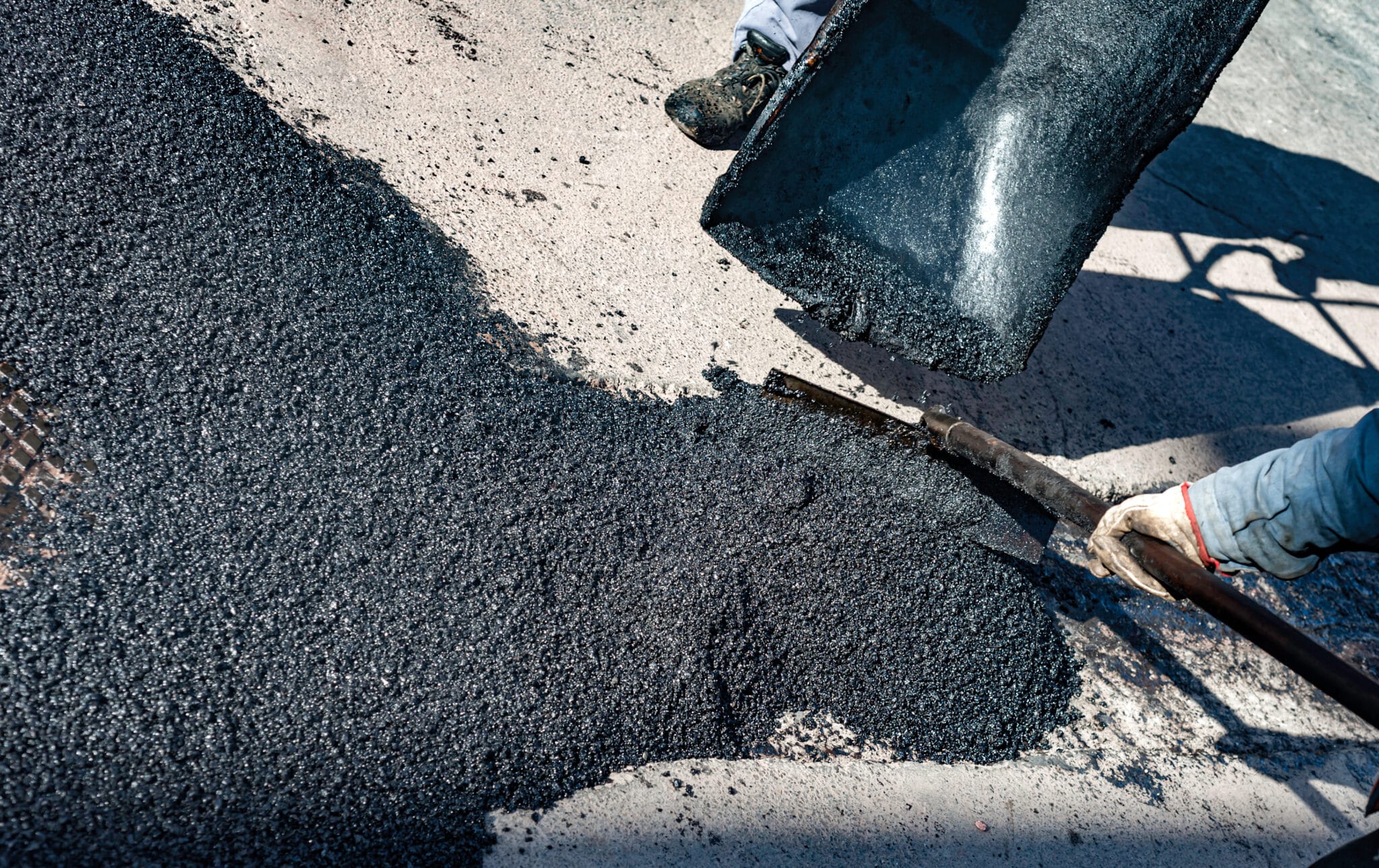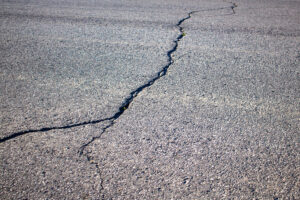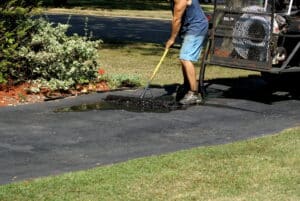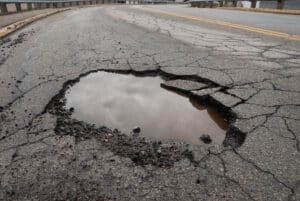If you’re a property manager or homeowner responsible for maintaining asphalt surfaces like driveways or parking lots, you’ve likely faced the need for quick, effective pavement repairs. One common question that comes up during patching projects is: Can you torch cold patch asphalt?
Cold patch asphalt is a convenient, ready-to-use solution designed for filling small potholes, cracks, and minor surface damage. It’s especially popular for its ease of use and ability to be applied without heavy equipment. Still, many wonder if using a torch to heat the material could help it bond better or speed up the curing process.
In this post, we’ll answer whether torching cold patch asphalt is recommended, explore the best times and conditions for applying it, and share practical tips to help you get the most out of your asphalt repair efforts.
What is cold patch asphalt?
Cold patch asphalt, also known as cold asphalt mix (CMA), is a type of asphalt that’s mixed and applied at lower temperatures, typically between 0-50 degrees Fahrenheit. The materials that produce a cold asphalt patch are usually aggregate, bitumen emulsion, and a small amount of water. It’s combined to create a workable mixture that’s applied to the asphalt’s surface, compacted, and left to cure until it’s durable.
Cold patching asphalt is practical for areas with extremely hot and cold climates because it can be used in a wide range of temperatures. It’s also a cost-effective option for smaller asphalt repairs like potholes and cracks that are at a maximum of two inches deep.
Some disadvantages of cold patching asphalt are applying it to asphalt in poor condition or severe pavement damage. Cold patch asphalt isn’t as durable, making it unsuitable for heavy and high-traffic areas like large parking lots. Due to its shorter shelf life, it’s best for quick and easy repairs without waiting for ideal weather conditions to apply it.
Can You Torch Cold Patch Asphalt? 3 Reasons Why You Shouldn’t
Asphalt repairs are something that should be kept to the professionals, and never done without experience, especially if you’re working with commercial property or public property. Asphalt surfaces, such as parking lots, have rules and regulations, and can put you at risk of liability and safety issues if your DIY repairs do not comply with public standards and regulations.
Below we’ll break down three reasons why you shouldn’t torch cold patch asphalt.
1. Open Flames Are Dangerous
First and foremost, open flames are dangerous, especially if your asphalt is in a public place. If you don’t know how to patch asphalt at any temperature, then you should avoid heating cold patch asphalt.
Heating asphalt with a torch risks fires and safety issues, especially if it’s a parking lot with commercial buildings, vehicles, and pedestrians nearby. If you want a fast patch asphalt, always hire asphalt professionals to prevent any safety issues that can also prolong your repair times.
2. DIY Asphalt Repairs Risk Costly Mistakes
It’s not uncommon to not know how to use cold patch asphalt as a property or homeowner. This is why there are asphalt professionals to help with asphalt patches to prevent DIY asphalt repairs. We strongly advise against DIY asphalt repairs because they can cause costly mistakes.
There are many types of asphalt damages and as mentioned, cold patching asphalt isn’t ideal for severe repairs. Cold patch asphalt is best applied for minor pothole repairs and cracks. If it’s used on extensive cracks and large potholes, the damage can expand further — which can be more costly to fix.
Property and homeowners also must know when to seal vs. repair asphalt, so getting your pavement inspected should be the route you take instead of DIY asphalt repairs. There are many signs of asphalt repairs to watch and they’re commonly confused with one another. Prevent possible repair costs from fixing DIY asphalt repairs by hiring asphalt professionals who know how to inspect and fix all types of asphalt damage.
3. Can Cause the Cold Patch Asphalt to Lose its Effectiveness
If you don’t know how to use cold patch asphalt, you risk losing its effectiveness in repairing the pavement. Cold patch asphalt won’t harden if you don’t follow the instructions thoroughly or use it for extensive asphalt damage – even if it’s for a temporary fix.
Torching cold patch asphalt may seem like a quick and easy solution to help it harden faster, but it’s specifically manufactured to cure on its own in colder conditions — and will potentially dry it out and unnecessarily shorten its life span. It’s a shortcut that will render the repair less effective.
If you notice your asphalt breaking, contact asphalt professionals to assess the damage and provide the best solution for your asphalt repairs.
How to Get Cold Patch Asphalt to Harden
Now that you know the answer to whether or not you can cold patch asphalt, many home and property owners still want to know how to get cold patch asphalt to harden safely and effectively. The first step in applying this type of asphalt repair is knowing how to soften patch asphalt.
Cold patch asphalt has a soft and squishy consistency that needs heat to become soft enough to bond with the pavement. While in this softened state, it can be compacted into the shape of the pothole or crack, securely sticking like a strong adhesive. Depending on the specific brand of cold mix asphalt, it may harden either through air exposure over a few hours or immediately after being compressed by vehicle traffic.
Additionally, if you have used an asphalt cold patch for repairs and it has started to ravel, sealcoating could help lock the aggregate in and make the patch last longer. At Superior Asphalt, we offer asphalt sealcoating services to preserve your asphalt’s lifespan and fix any DIY asphalt repairs gone wrong.
We always recommend hiring asphalt professionals if you don’t know how to get cold patch asphalt to harden or notice your asphalt raveling. Asphalt professionals know how to use an asphalt patch in all temperatures and will provide the best solution for your pavement condition.
Cold Patch Asphalt FAQs
How long does cold patch asphalt last?
Cold patch asphalt has a shorter lifespan than warm and hot mix asphalt. It’s best used for temporary asphalt repairs and maintenance like minor potholes and cracks. On average, depending on traffic weight and volume, cold patch asphalt lasts around a month or two until a permanent asphalt repair is required.
How long for asphalt patch to dry?
Cold patch asphalt drying times depend on the materials used. Some brands dry within three to four hours. Other brands have cold patch asphalt instructions with flexible pavement repair. This type of cold patch asphalt can dry immediately, and the more it’s driven over, the faster it will harden because of the leveling and compacting from vehicles. Always ask your asphalt professionals about your cold patch asphalt drying times so you don’t disrupt the drying and curing process.
My cold asphalt won’t harden, what do I do?
If your cold asphalt won’t harden, you didn’t apply it correctly or didn’t leave enough time for it to dry. Depending on the brand’s cold patch asphalt instructions, it cures from the air within a few hours or must be driven on immediately to compact it further. If your cold asphalt won’t harden after that, contact asphalt professionals to assist before the original damage expands into more costly repairs.
Is any prep required for cold patch asphalt?
Before applying cold patch asphalt, it’s crucial to clean the damaged area. Remove debris, loose asphalt, and any foreign materials from the pothole or crack. This ensures that the cold patch adheres securely to the existing pavement and creates a lasting seal.
What maintenance is required for cold patch asphalt?
After your cold patch asphalt repair has cured, it’s important to implement regular maintenance practices. Sealcoating can help protect the patch and extend its lifespan. Regular inspections and timely repairs of any new damage can prevent the need for extensive repairs in the future.
Contact Superior Asphalt for a Cold Patch Asphalt Repair
Using a torch to heat and apply cold patch asphalt may seem quick and easy, but it’s not recommended as a DIY asphalt repair solution. Open flames can be dangerous, and the high temperatures can alter the cold patch’s properties which can cause it to lose its effectiveness.
Now that you know the answer to “Can you torch cold patch asphalt?” hiring asphalt professionals to ensure a high-quality repair is the next step— especially if there’s extensive pavement damage.
Contact Superior Asphalt for cold patch asphalt repairs and revive your asphalt today!




